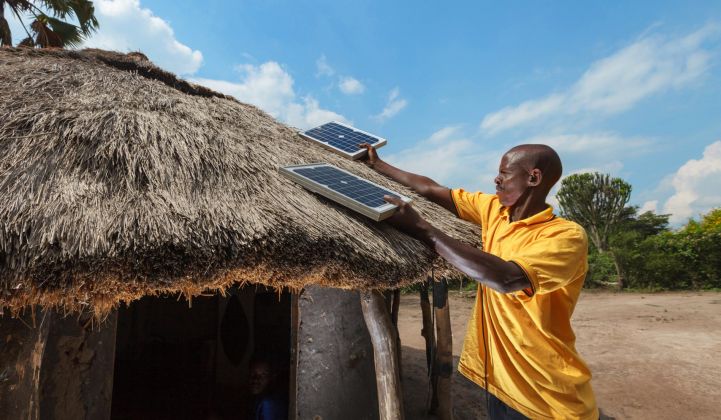French multinational Engie announced Thursday that it plans to acquire Fenix International, a pioneering company in Africa’s home solar market.
The acquisition accelerates Engie’s entry into the off-grid energy market and shows progress toward the utility’s goal of providing 20 million people around the world with access to decarbonized, decentralized energy by 2020. It’s also a major development for the broader energy access market, where players have struggled to access capital.
“This is a big deal for the energy access space,” said GTM Research analyst Benjamin Attia. Engie’s acquisition of Fenix “unlocks a massive global commercial debt market mostly untapped in the off-grid space to date,” he said.
“To have the regulatory weight and access to capital Engie has is huge for leveraging additional investment,” Attia added. “Engie will be able to help Fenix raise hundreds of millions in debt, which goes a long way with distributed, pay-as-you-go (PAYG) products.”
Fenix currently employs more than 350 people and operates primarily in Uganda, where it is the leading home solar provider, with more than 140,000 customers. In total, Fenix has delivered solar power to more than 900,000 people in East Africa. The company recently expanded into Zambia and plans to launch operations in other African countries.
“Fenix will be the agile growth engine for Engie’s [solar home systems] business in Africa and enable us to become a leading profitable off-grid energy services company on the continent, reaching millions of customers by 2020,” said Bruno Bensasson, CEO of Engie Africa, in a statement.
“By joining forces with Engie -- one of the world’s largest independent utility companies with a firm commitment to a decentralized, decarbonized and digital energy revolution -- we will greatly accelerate the path to our vision,” said Lyndsay Handler, CEO of Fenix International.
Debt financing is pivotal for off-grid service providers, especially those that use PAYG business models with low-income customers, Attia said. In these contexts, equity-led consumer financing quickly transforms the core business of an energy services provider in the direction of financial services provider.
Other approaches include holding risk off the balance sheet by using a special purpose vehicle or securitization and asset-based financing, which, with the right partners, can help to create a secondary market and move credit risks to commercial investors.
The Fenix acquisition comes after recent investments from Engie in other off-grid solar companies including BBOXX in West Africa, Mera Gao Power in India and Bangladesh, and Kingo Energy in Latin America. It appears Fenix will retain operational independence from its new French parent company once the deal closes. The purchasing price was not disclosed.
According to Attia, this is only the second real instance of merger and acquisition activity in the off-grid clean energy space, following Mobisol's acquisition of Lumeter in June. But there have been a slew of investments in the space in recent weeks, he added, including a new $80 million round for M-KOPA.
While Engie’s acquisition and investments put the company closer to its 20 million by 2020 target, 600 million people in Africa alone lack access to modern energy sources. Recent data from the United Nations and Sustainable Energy for All shows that current investment in energy access for 20 countries in Asia and Africa is less than half of the $45 billion needed annually.
“While it’s good to see encouraging, early-stage progress in a handful of countries on electricity access, we urgently need targeted, refined strategies to increase investment in integrated electricity solutions,” said Sustainable Energy for All CEO Rachel Kyte.
Only $200 million a year -- 1 percent of financing commitments -- goes to decentralized energy solutions like Fenix’s household solar systems, making the acquisition even more impactful.
The International Energy Agency forecast in a new report that off-grid solar providers will have 185 million customers by 2030.




